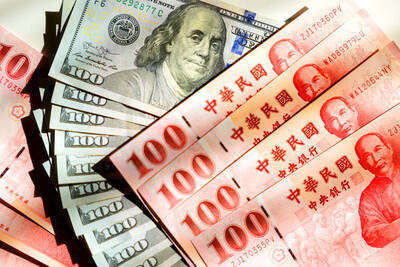The government is seeking to pull the nation out of economic gloom by increasing spending on public construction projects next year, but academics expressed doubt yesterday that the efforts would be adequate to counter the global slowdown that is hurting foreign trade.
The Cabinet will brief President Ma Ying-jeou (馬英九) on Thursday on its 2009 fiscal budget proposal, projected at NT$1.83 trillion (US$59.68 billion), up 6.9 percent from this fiscal year.
The funding earmarked for economic development is forecast to surge 20 percent, topping all other outlays, with NT$210 billion to be spent on public works, the Council for Economic Planning and Development said.
The council said the government’s economic strategy would focus on stimulating growth and stabilizing consumer prices to cope with inflation and other challenges at home and abroad.
Norman Yin (殷乃平), a professor at National Chengchi University’s Money and Banking Department, said that by boosting public spending, the government would expand domestic demand and raise the GDP, but it would not boost foreign trade — the mainstay of the nation’s exported-oriented economy.
Official statistics showed that export orders rose 9.3 percent year-on-year to US$31.36 billion in June, the lowest growth since March last year, because of decelerating growth in electronics and precision equipment sales.
“The spending plan will not be able to offset falling demand from the US and other trade partners,” Yin said by telephone.
The bulk of the construction budget, 53.3 percent, will be used to carry out Ma’s campaign pledge to turn Taiwan into “an intelligent country.” About NT$45.9 billion is earmarked for transportation infrastructure and NT$18.2 billion will be spent on flood control projects.
The council said the expenditure could create 180,000 jobs and raise GDP growth by 1.68 percent next year.
Daw Jaw-yang (戴肇洋), a researcher at the Taiwan Research Institute (台綜院), said it would be an uphill struggle for the government to fight inflation caused by rising fuel and raw material costs.
“The government is poorly equipped in the battle against imported inflation as the country has no control over global oil or food prices,” Daw said.
As long as crude and raw material prices remain volatile, any optimism may prove premature, Daw said, adding that several economic research bodies had already trimmed their GDP growth forecasts for this year.
Last week, the Taiwan Institute of Economic Research (台經院) cut its GDP growth forecast to 4.27 percent from its April prediction of 4.3 percent on concerns of lower consumer spending. Ten days earlier, the Chung-Hua Institution for Economic Research (中經院) trimmed its forecast from 4.76 percent to 4.5 percent.

WEAKER ACTIVITY: The sharpest deterioration was seen in the electronics and optical components sector, with the production index falling 13.2 points to 44.5 Taiwan’s manufacturing sector last month contracted for a second consecutive month, with the purchasing managers’ index (PMI) slipping to 48, reflecting ongoing caution over trade uncertainties, the Chung-Hua Institution for Economic Research (CIER, 中華經濟研究院) said yesterday. The decline reflects growing caution among companies amid uncertainty surrounding US tariffs, semiconductor duties and automotive import levies, and it is also likely linked to fading front-loading activity, CIER president Lien Hsien-ming (連賢明) said. “Some clients have started shifting orders to Southeast Asian countries where tariff regimes are already clear,” Lien told a news conference. Firms across the supply chain are also lowering stock levels to mitigate

Six Taiwanese companies, including contract chipmaker Taiwan Semiconductor Manufacturing Co (TSMC, 台積電), made the 2025 Fortune Global 500 list of the world’s largest firms by revenue. In a report published by New York-based Fortune magazine on Tuesday, Hon Hai Precision Industry Co (鴻海精密), also known as Foxconn Technology Group (富士康科技集團), ranked highest among Taiwanese firms, placing 28th with revenue of US$213.69 billion. Up 60 spots from last year, TSMC rose to No. 126 with US$90.16 billion in revenue, followed by Quanta Computer Inc (廣達) at 348th, Pegatron Corp (和碩) at 461st, CPC Corp, Taiwan (台灣中油) at 494th and Wistron Corp (緯創) at

NEW PRODUCTS: MediaTek plans to roll out new products this quarter, including a flagship mobile phone chip and a GB10 chip that it is codeveloping with Nvidia Corp MediaTek Inc (聯發科) yesterday projected that revenue this quarter would dip by 7 to 13 percent to between NT$130.1 billion and NT$140 billion (US$4.38 billion and US$4.71 billion), compared with NT$150.37 billion last quarter, which it attributed to subdued front-loading demand and unfavorable foreign exchange rates. The Hsinchu-based chip designer said that the forecast factored in the negative effects of an estimated 6 percent appreciation of the New Taiwan dollar against the greenback. “As some demand has been pulled into the first half of the year and resulted in a different quarterly pattern, we expect the third quarter revenue to decline sequentially,”

The New Taiwan dollar yesterday extended its losing streak to a fifth straight session, closing at NT$29.719 against the US dollar, down NT$0.13 from the previous day, as broad US dollar strength and lingering trade uncertainties weighed on non-US dollar currencies, traders said. The NT dollar depreciated NT$0.357, or 1.21 percent, against the greenback over the past five trading days, central bank data showed. Turnover at Taipei Forex Inc fell to US$878 million, reflecting subdued investor activity as markets await Washington’s tariff rate on Taiwan. “The US dollar index has shown significant strength in recent sessions, putting pressure on non-dollar currencies,” a Taipei-based